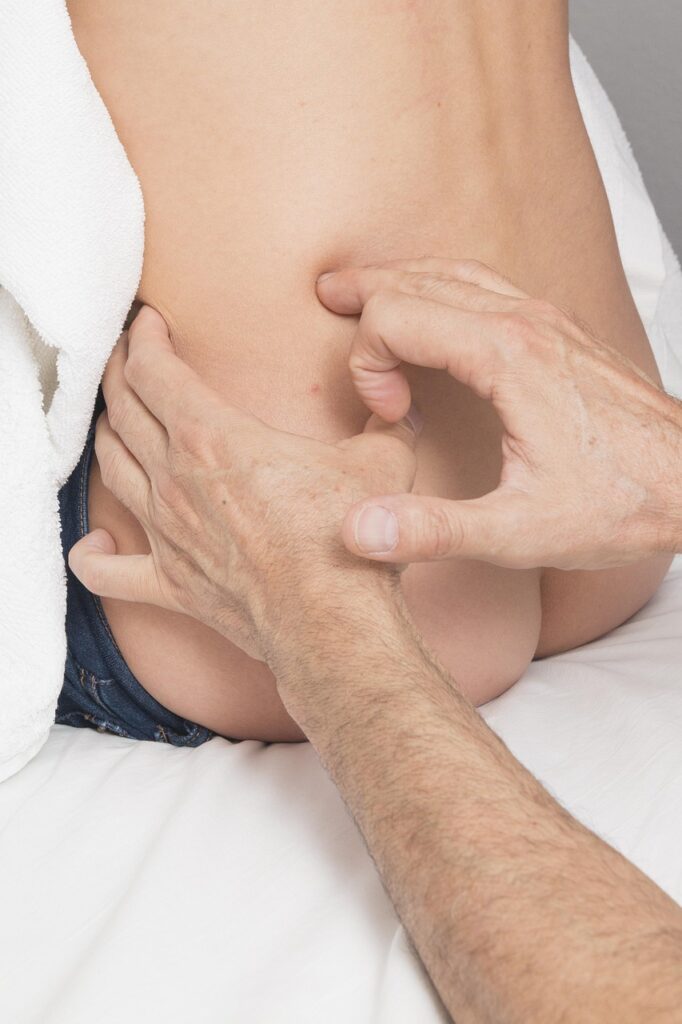Struggling with
Lower Back
Improve range of movement, remove knots and relieve strains in the lower back
Weight Lifting
Repetitive movement from lifting weights, particularly with poor technique
Desk Work
Sitting at a desk for extended periods with bad posture or desk set-up
Golfer
Over stretching and repeated rotation needed for the perfect golf swing
Racket Sports
The force and rotation applied can cause increased strain on the lower back
Did you know?
Body weight
Your lower back supports almost the entire weight of your upper body.
That’s a huge job especially when bending, lifting, or sitting for long periods. No wonder it’s one of the most common areas for pain and tension!
The sciatic nerve
Your sciatic nerve is the largest nerve in your body and it runs through your lower back.
When compressed or irritated, it can cause pain, tingling, or numbness that travels down your leg (aka sciatica). Massage can help relieve the pressure.
Tight hips
Tight hip flexors can cause lower back pain.
They attach to the front of your spine so when they shorten (from too much sitting), they pull on the lower back and tilt your pelvis. Stretching, massage, and mobility work can make a big difference.
The Lower Back
The lower back, or lumbar region, is a critical part of the spine, comprising five vertebrae (L1-L5). It’s supported by intervertebral discs, spinal nerves, muscles, ligaments, and tendons, and it plays a key role in supporting the upper body and facilitating movement.
Various muscles, including the erector spinae, quadratus lumborum, and transversospinalis muscles, support the spine, control movement, and maintain posture.
The Nerve Highway
The sciatic nerve is the longest and thickest nerve in your body, running from your lower back down to your toes. It’s formed by several nerve roots that exit the spine in your lumbar and sacral region.
When these nerve roots are irritated whether from tight muscles, disc issues, or inflammation. You might feel shooting pains down your leg and even numbness in the foot.


Typical Treatment
A typical treatment cycle is between 3-6 weeks with 45 minute massages focused on relieving tension across targeted muscle groups.
As lower back pain can be caused by multiple muscle groups, the initial consultation will begin with a functional assessment to identify key areas of focus.
Possible areas of focus:
Quadratus Lumborum (QL): A muscle in the lower back
Gluteal Muscles: The muscles in the buttocks
Erector Spinae Muscles: Muscles along the spine
Hip Flexors: Muscles that flex the hip joint
Soas Muscle: A hip flexor that attaches to the lumbar spine
A range of soft tissue and sports massage techniques and pinpointing knots around targeted areas, alongside joint mobilisations and stretching is used to alleviate tension.
Have more questions? Why not have a read of our FAQ.
Get in touch
Prime Fitness 247
31-33 Market Pl, Knaresborough HG5 8AL
Tel: 07592224592
Email: contact@dailysummits.com
Opening Hours
Appointments are limited and tailored to your needs. Reserve and experience the difference of focused one to one care.
Mon - Fri
09:00 - 19:00
Sat
11:00 - 16:00
What Our Customers Say About Us


